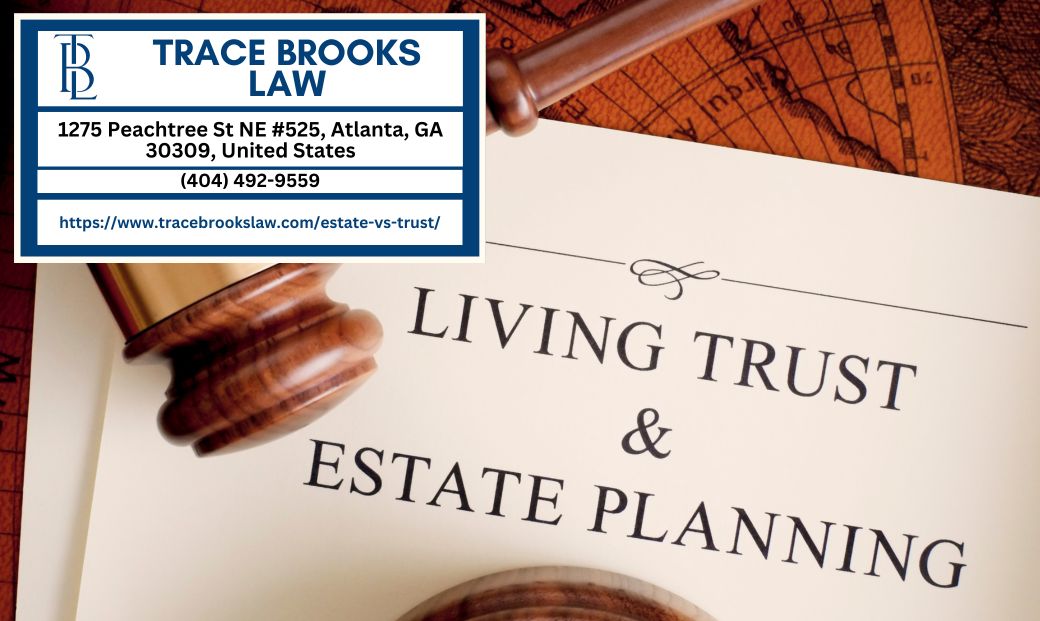Trace Brooks (https://www.tracebrookslaw.com/estate-vs-trust/), an Atlanta estate planning attorney at Trace Brooks Law, offers an insightful guide on the differences between estates and trusts, critical components of estate planning for Georgia residents. This article breaks down these legal structures, emphasizing their importance in planning for the future management and distribution of assets. With the goal of helping clients make informed decisions that reflect their financial and familial situations, Brooks shares essential knowledge on choosing the right estate planning tool.
Estate planning often requires individuals to choose between creating an estate or establishing a trust, both of which serve different purposes depending on the circumstances. Trace Brooks, an Atlanta estate planning attorney, emphasizes that each option leads to distinct outcomes, and understanding these differences is crucial for those seeking to secure their legacy and protect their loved ones.
“Deciding whether to establish an estate or trust can be daunting,” says Atlanta estate planning attorney Trace Brooks. “However, by understanding the key differences between these legal structures, individuals can better align their estate planning goals with their long-term financial and familial needs.”
According to Trace Brooks, an estate encompasses all the assets an individual leaves behind at the time of death, except for jointly owned property or assets transferred prior to death. The estate exists to facilitate the one-time distribution of these assets based on the deceased’s will or Georgia’s intestacy laws, in cases where no will is present. Once the assets have been distributed, the estate ceases to exist. Brooks further highlights that estate planning can cover a broad range of asset types, including real property, personal belongings, and financial assets such as bank accounts and investments.
For Georgia residents managing estate administration, the process typically begins with probate, the legal procedure that validates the deceased’s will or applies intestacy laws in the absence of a will. Brooks emphasizes the significance of probate in ensuring that all debts are paid and that the assets are distributed according to the deceased’s wishes or the law.
In contrast, trusts operate under different principles. A trust is created when the grantor legally transfers assets to a trustee, who manages them on behalf of beneficiaries. Unlike estates, trusts can be established during the grantor’s lifetime or upon their death through a testamentary trust. Trusts offer numerous benefits, including bypassing the probate process, which Brooks notes as a critical advantage for those seeking greater privacy and efficiency in distributing their assets.
“When comparing estates and trusts, it’s essential to consider factors such as the need for privacy, control over the timing of asset distribution, and protection against creditors,” says Trace Brooks. “Trusts, in particular, provide a high degree of control, allowing grantors to specify how, when, and to whom assets are distributed, which is especially beneficial for individuals with complex estates or minor beneficiaries.”
In Georgia, the flexibility of trusts makes them an appealing option for estate planning. Brooks explains that trusts come in various forms, including revocable trusts, irrevocable trusts, special needs trusts, and charitable trusts, each designed to meet different objectives. Revocable trusts, for example, offer the flexibility to be altered or dissolved during the grantor’s lifetime, while irrevocable trusts are typically permanent and provide asset protection and tax advantages.
When it comes to choosing between an estate and a trust, Trace Brooks advises clients to carefully evaluate their financial situation, family dynamics, and long-term goals. For those with complex assets or unique family circumstances, such as minor children or special needs family members, trusts often provide a more streamlined and effective solution. On the other hand, for smaller estates or situations where heirs agree on the distribution, probate through an estate may suffice.
In addition to the technical distinctions between estates and trusts, Brooks emphasizes the importance of timing. Estates typically distribute assets after the probate process, which can be lengthy and public. Conversely, trusts can facilitate immediate or conditional asset distribution based on the grantor’s preferences, without the need for probate and with greater confidentiality.
For residents of Georgia seeking to plan their estate effectively, Brooks advises a thorough understanding of the differences between estates and trusts. Working with an Atlanta estate planning attorney can help individuals ensure that their assets are managed according to their wishes, while minimizing potential legal and financial complications.
About Trace Brooks Law:
Trace Brooks Law is a prominent law firm based in Atlanta, well-versed in estate planning and asset protection. Led by Atlanta estate planning attorney Trace Brooks, the firm is dedicated to helping individuals and families in estate and trust planning, further ensuring their assets are protected and their wishes are honored. With a focus on personalized service and clear guidance, Trace Brooks Law is committed to providing clients with the tools they need to secure their legacy for future generations.
Embeds:
Youtube Video: https://www.youtube.com/watch?v=UshdK7zs2kc
GMB: https://www.google.com/maps?cid=16944830140697754407
Email and website
Email: trace@tracebrookslaw.com
Website: https://www.tracebrookslaw.com/
Media Contact
Company Name: Trace Brooks Law
Contact Person: Trace Brooks
Email: Send Email
Phone: (404) 492-9559
Address:1275 Peachtree St NE #525
City: Atlanta
State: Georgia 30309
Country: United States
Website: https://www.tracebrookslaw.com/
Press Release Distributed by ABNewswire.com
To view the original version on ABNewswire visit: Atlanta Estate Planning Attorney Trace Brooks Explains the Key Differences Between Estates and Trusts in a Recent Article
